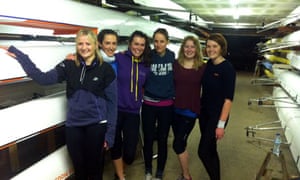Nowadays, four years is the fashionable time frame to transform yourself from a mere squishy mortal into a sun-kissed Olympian. That also leaves enough time to be an honorary frow-inhabitant at London fashion week, lift the Strictly Come Dancing glitter ball and have a crack at the Sports Personality of the Year afterwards.
A lifetime of dedicated training? What an unnecessary yawn-fest. Team GB’s Helen Glover rowed to gold in the women’s coxless pair at Eton Dorney last summer and she was only 27 – and started rowing four years previously. I’m 24, my sporting career stretching yonder, plus I have a stage-mother I’ve never properly used. Surely Rio is as good as booked.
Travel plans all but made, I Googled rowing clubs between my office and my flat – little did I know I was one of 33,000 people who did a similar postcode search after the first Olympic rowing event – and the search engine spat out Lea Valley Rowing Club (Lea RC) with news of a Learn2Row programme starting in September. I signed away three lots of Saturdays and Sundays in one debit card payment before the national anthem had finished, and then stared bleakly at my 5ft 4in frame – would enthusiasm be enough?

You can find a large dollop of Olympic legacy at Lea RC, not only because the Millennium stadium is a mere row down the river from there. Squeezing into the attic gym above a crooked boathouse in sunny Spring Hill, Clapton, it became obvious that I wasn’t the only would-be rower, but one of about 80. “Why are you doing this, then?” I asked a girl with rainbow legwarmers. “Oh you know, because of the Olympics”, she grinned – the cheerful cliche nigh-on everyone was admitting to as our sloppy style was scrutinised on the ergometers and a score of fanatical, unpaid coaches boomed the basic mechanics of boating at us.
Mastering rowing is tough. It’s both an endurance and explosive sport that requires lung-splitting levels of anaerobic and aerobic fitness. It demands a concentrated, technical brain and diligent repetition of the basics, a sense of cadence and balance, a thick hide to withstand caustic comments from coaches and raw blisters on your fingers, and the fire to eek out the last energy from your burning body in order to win.
That 32,000 people signed up for similar courses around the country is extraordinary, but arguably the biggest coup is the number of women recruits. Rowing cliches revolve around the image of blond, flip-flopped Winklevoss twins, Oxbridge battles, automaton bods, social cliques, and – of course – strapping menfolk. No longer, according to GB rowing performance director David Tanner, the driving force behind the first ever women’s Olympic gold (in 2000) and three women’s golds in 2012. He says that in the past, the ratio of new members has been four men to one woman. This time, the ratio is three to two.
It is difficult to gauge where we’ll be four years from now, as athletes line up in Rio, but 24 of my peers in the September Learn2Row course are still training hard four months later, four times a week or more, on an accelerated Learn2Race programme. So all-consuming is the sport that, when faced with a row-less Saturday morning, one chap said he had “nothing in life to get up for”. Similarly, another soggy friend told me she actually enjoys the exhausted feeling after rowing that leaves her in the “closest I can get to a foetal position”.
For while recreational rowers are welcome, most women and men at Lea are devotedly hungry for racing. My own embarrassingly limited experience of actual competition – a “toy regatta” on the final Sunday of the Learn2Row course, watched by maybe multiple figures of dawdling celebrity dog walkers (Tommy of BBC Ground Force fame is my regular celeb spot at Lea) – was all it took to know I would never lie-in on the weekend again. I just can’t get enough of the freezing cold, the heavy boats and the lactic acid buildup. Personally, I have never been happier.
So while natural talent is key, a certain level of obsession and bloody-mindedness can and will make you go far. It’s pertinent that after selection for the Sporting Giants scheme, Glover remembers someone saying: “A gold medallist in 2012 could be sat in this room. Look around you.” Her next thought was: “Right, I’m going to make that me.”
Fancy learning to row? You can find your nearest rowing club here: britishrowing.org/clubs/club-finder
Source: Read Full Article
